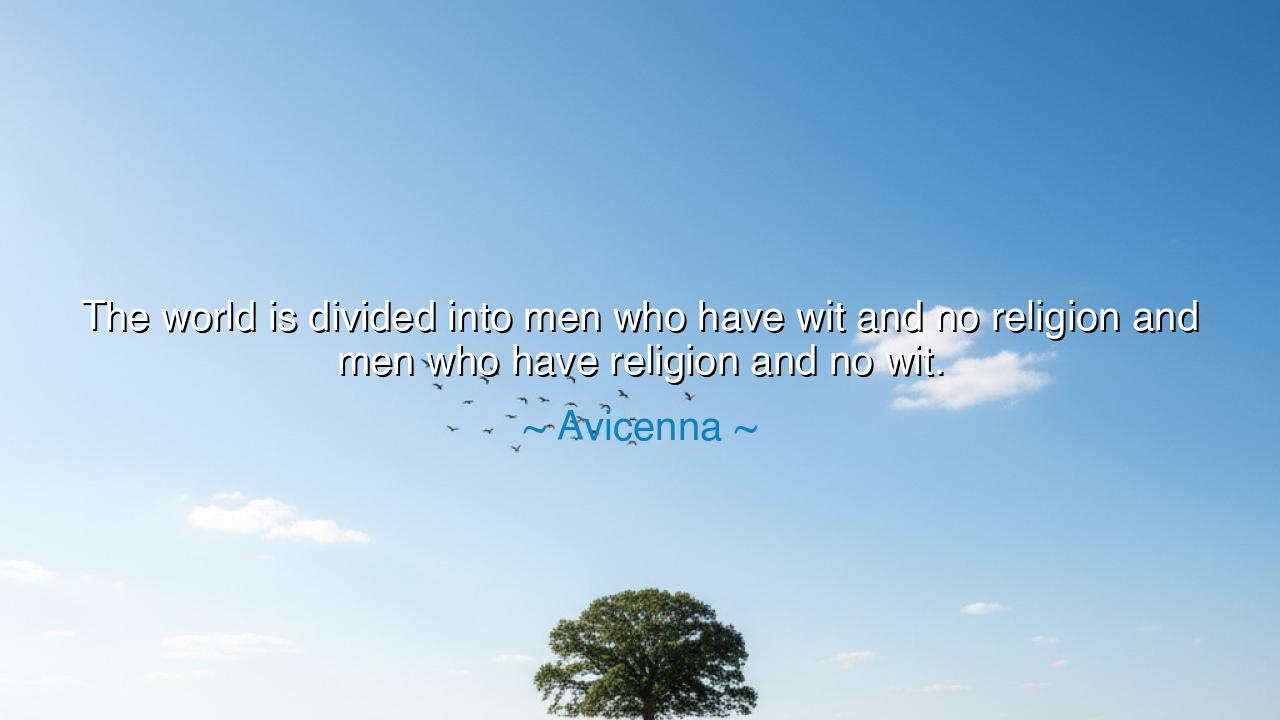
The world is divided into men who have wit and no religion and
The world is divided into men who have wit and no religion and men who have religion and no wit.






“The world is divided into men who have wit and no religion, and men who have religion and no wit,” said Avicenna, the luminous philosopher of Persia — healer of bodies and minds, master of both reason and faith. In these words lies a lament, not for one side or the other, but for the chasm that separates them. Avicenna lived in an age when faith burned brightly, but knowledge was dimmed by fear; when the mind that questioned was often branded heretical, and the man who believed was mocked as naïve. His words are both dagger and mirror — piercing hypocrisy and reflecting truth. He saw the tragedy of human nature: that wisdom and belief, which should have walked hand in hand, often stood apart, estranged like brothers who had forgotten their kinship.
In his time, the world trembled between dogma and reason. The scholars of the madrasa debated the will of God, while the physicians and philosophers sought the order of nature. Avicenna, whose own mind bridged these realms, understood what few could: that wit without faith becomes arrogance, and faith without wit becomes blindness. The one mocks the divine as superstition; the other rejects thought as sin. Between them, truth is lost — for truth, he knew, resides not in division, but in harmony.
Think of Galileo Galilei, born centuries later, a man of immense wit who dared to look through the lens of reason and saw the heavens anew. He discovered that the Earth moved around the sun — a revelation that shook the foundations of belief. Yet for his wit, he was condemned by the keepers of religion, who feared that truth would undo faith. Galileo, like Avicenna before him, stood at the crossroads of enlightenment and obedience. His struggle was not against God, but against the walls men had built around Him. In this, Avicenna’s words echo through time — that our greatest folly lies not in faith nor reason, but in our failure to reconcile them.
There are those, Avicenna warns, who possess cleverness without reverence — who see the world as a puzzle to be solved, yet never feel its wonder. These are the men of cold intellect, who dissect the flower but never smell its fragrance. And there are others who possess devotion without thought — who kneel in prayer yet close their eyes to truth. These are the souls who cling to the letter but lose the spirit. Both err, for neither truly knows the fullness of creation. Wisdom demands both — the flame of intellect and the light of faith, not as rivals, but as twin stars guiding the soul.
To possess wit alone is to walk proudly in darkness, believing one’s own torch brighter than the sun. To possess religion alone is to walk blindly in daylight, ignoring the light that shines all around. Avicenna calls us to awaken, to see that the mind and the spirit were never meant to war, but to weave together the fabric of understanding. A mind that thinks without humility becomes dangerous; a soul that believes without questioning becomes stagnant. Harmony is the golden mean — the wisdom of balance that gives birth to civilization, compassion, and progress.
History bears witness to those who united reason and faith. The builders of the great universities of Baghdad, the scholars of Cordoba, the sages of Athens and Alexandria — all sought knowledge not as rebellion against God, but as worship of His creation. They believed that every law of the cosmos was an echo of divine order, that to study the stars was to read the handwriting of the Eternal. From such union came medicine, poetry, philosophy, and science — the very pillars of human advancement.
So, what lesson shall we draw from Avicenna’s ancient wisdom? Let us not be divided as he once mourned. Let us cultivate wit that is humble, and faith that is intelligent. Let the scholar bow before the mystery of being, and let the believer open his eyes to the wonders of the world. In our age — where the clever mock belief and the pious reject reason — we must become bridge-builders once more.
And thus, dear listener, remember this: truth is whole, not halved. Seek knowledge as though it were prayer, and pray as though it were an act of learning. Be not among those who have wit and no religion, nor those with religion and no wit — but among the rare few who possess both, in harmony. For only they, as Avicenna taught, can see the world not as divided, but as it truly is: radiant, infinite, and one.






AAdministratorAdministrator
Welcome, honored guests. Please leave a comment, we will respond soon